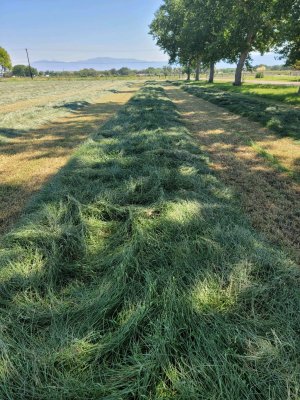Bamadan
Well-known member
I need some advice on some pasture/hay land. I have pasture land that was my Father-in-law's sweet potato farm, and after he got out of the potato business he ran cows on it. But, no pasture grass has ever been established on it, (just whatever came up).
I've been working on a plan(???). My plan was to drill(I have access to a drill) Fescue this Fall and some Rye or Ryegrass, then come back in the Spring and drill Bermuda in with the Fescue. I cut most of this pasture for hay on September 19, since that date we have not had enough rain to settle the dust. The forecast of rain this week is not looking promising. We are at about 2 1/2 months without significant rain.
My questions are:
*Note: This pasture had a heavy dose of chicken litter in early May of this year, so I had the most grass, I've ever had, all the way to frost (most grass, not the best grass)
I am located in North Central Alabama
Thanks for your Help!
Danny Miller
Cullman County, Alabama
I've been working on a plan(???). My plan was to drill(I have access to a drill) Fescue this Fall and some Rye or Ryegrass, then come back in the Spring and drill Bermuda in with the Fescue. I cut most of this pasture for hay on September 19, since that date we have not had enough rain to settle the dust. The forecast of rain this week is not looking promising. We are at about 2 1/2 months without significant rain.
My questions are:
- Am I OK to go ahead and drill Fescue and Winter grass (I know it's getting late), in dry ground?
- If I get Fescue drilled, am I OK to come back in the Spring and drill Bermuda?
- Is coated Fescue seed a better choice considering the lack of moisture?
- Is there a choice of Winter grass that would be better than others because of dry ground and or late date?
- Thoughts on Orchard grass?
*Note: This pasture had a heavy dose of chicken litter in early May of this year, so I had the most grass, I've ever had, all the way to frost (most grass, not the best grass)
I am located in North Central Alabama
Thanks for your Help!
Danny Miller
Cullman County, Alabama

